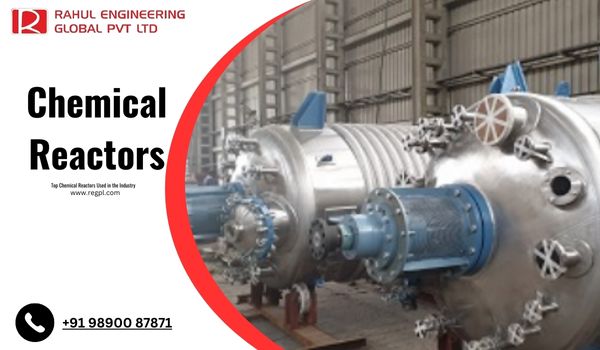Chemical reactors play a crucial role in countless industries, from pharmaceuticals and petrochemicals to food processing and materials science. These reactors are vessels designed to facilitate chemical reactions, converting raw materials into desired products through various processes. The choice of reactor depends on factors such as the type of reaction, desired product, scale of production, and economic considerations. In this blog, we'll explore some of the top chemical reactors across different industries and scales.
- Batch Reactors: Batch reactors are perhaps the simplest and most versatile type of chemical reactor. They operate by mixing reactants in a single vessel, allowing the reaction to occur over a period of time. Batch reactors are widely used in research laboratories, small-scale production, and industries where flexibility and ease of operation are essential. They are particularly suitable for processes with multiple stages or when dealing with sensitive or hazardous materials.
- Continuous Stirred-Tank Reactors (CSTR): Continuous stirred-tank reactors are common in both laboratory and industrial settings. They consist of a tank or vessel where reactants are continuously fed and products are continuously removed. The contents of the reactor are mixed using agitators or stirring mechanisms to ensure uniformity. CSTRs are ideal for steady-state processes and reactions requiring constant temperature and pressure conditions.
- Plug Flow Reactors (PFR): Plug flow reactors are designed to provide ideal conditions for reactions that involve continuous flow of reactants through a tubular system. Unlike CSTRs, PFRs offer minimal mixing, allowing for precise control over residence time distribution. This makes them suitable for reactions where selectivity and conversion rates are critical. PFRs are commonly used in the production of fine chemicals, polymers, and in the petrochemical industry.
- Fixed-Bed Reactors: Fixed-bed reactors are characterized by a stationary bed of catalyst or adsorbent material through which reactants flow. These reactors are widely employed in heterogeneous catalysis, where the catalyst is in a different phase from the reactants. Fixed-bed reactors offer high surface area contact between reactants and catalyst, leading to efficient mass transfer and improved reaction rates. They are extensively used in the production of fuels, chemicals, and environmental remediation processes.
- Fluidized Bed Reactors: Fluidized bed reactors operate by suspending solid particles in a fluidizing medium (typically a gas or liquid). The continuous movement of the particles creates a fluidized state, allowing for excellent mixing and heat transfer. Fluidized bed reactors are highly versatile and find applications in catalytic cracking, biomass conversion, and chemical synthesis processes. They offer advantages such as uniform temperature distribution, enhanced mass transfer, and reduced catalyst deactivation.
- Membrane Reactors: Membrane reactors integrate separation and reaction processes within a single system, utilizing semipermeable membranes to selectively transport reactants, products, or by-products. These reactors offer advantages such as improved yield, reduced waste, and enhanced selectivity by continuously removing reaction products. Membrane reactors are employed in various industries including petrochemicals, pharmaceuticals, and environmental engineering.
In conclusion, the choice of chemical reactor depends on a multitude of factors including the nature of the reaction, desired product specifications, scale of production, and economic considerations. Each type of reactor has its advantages and limitations, and selecting the right one is crucial for optimizing process efficiency and product quality. As technology advances, new reactor designs and innovations continue to emerge, driving progress in chemical synthesis and process engineering. Whether in the confines of a laboratory or on an industrial scale, chemical reactors remain indispensable tools for transforming raw materials into valuable products that shape our modern world.
Feel free to reach out to us at REGPL (Rahul Engineering Global Pvt. Ltd.) for all your inquiries and requirements regarding chemical reactors in Pune, India. Our dedicated team is committed to providing top-notch solutions tailored to your needs. Whether you have questions about our products, need technical assistance, or want to discuss a customized solution, we're here to help. Contact us today, and let's collaborate to meet your chemical reactor needs efficiently and effectively.

